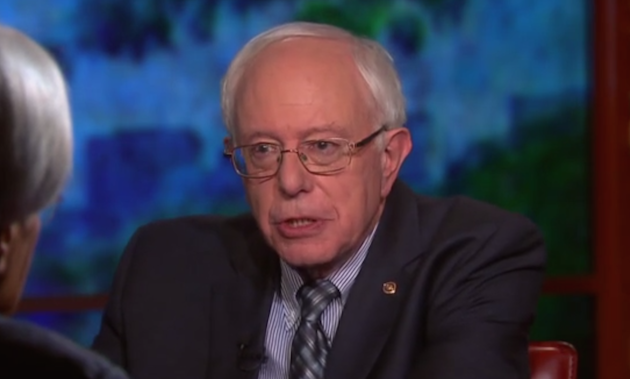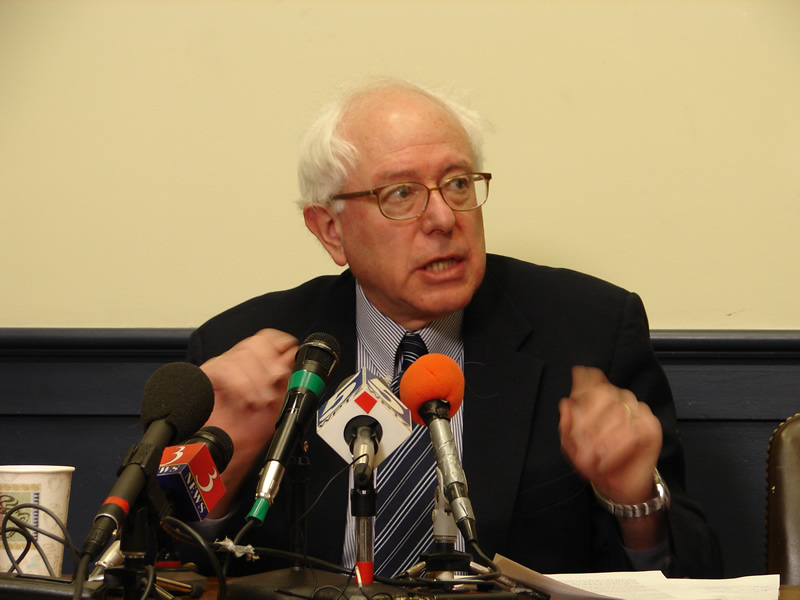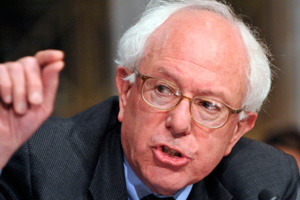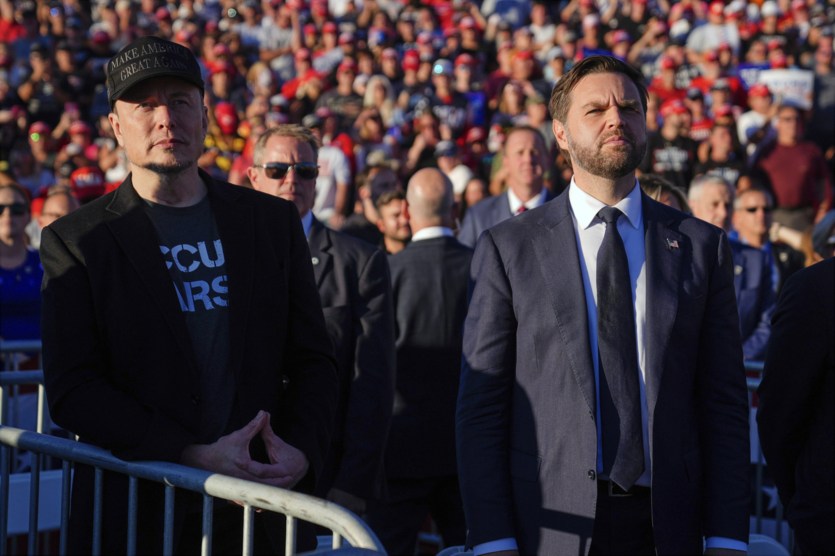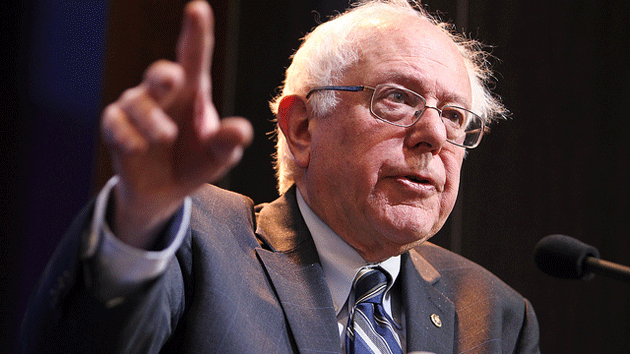
Bernie Sanders<a href="https://www.flickr.com/photos/96739999@N05/16305933820/in/photolist-qQUb31-HKH72-bEPgK1-bEPgBq-r17vyM-65hH1m-6rAHHq-73Er2i-6cHssT-6KE8U7-d88JVS-bEPgRL-apd65r-ajeC46-9kmvAa-apfQhy-9TMtgV-9TMtMV-9TMt7t-9TMtyi-9TMtDp-9TMts6-9TMtZP-aiTAgn-aiTAyM-aiTAuD-8ZVNpE-5UvpVU-6rwzDH-6rr8HK-6rwzfP-6rwzLK-5TTUfg-9omDT5-q4foRC-q4sSqk-qXxPva-9kACiB-7YMVkZ-yvCRt-5Uvq3d-drh4Ze-5HUNig-aGoSb2-cUDwaC-213Kab-213K79-bUbSLC-5HdbEp-gHYFC3">Brookings Institution</a>/Flickr
Sen. Bernie Sanders of Vermont, the longest-serving independent in Congress and its only self-described democratic socialist, is best known for his stands against wealthy special interests and in favor of government programs that help the poor and the middle class. Now 73, Sanders announced last year that he may run for president in 2016. During a swing through San Francisco this week, he stopped by Mother Jones HQ to talk to us about America’s greed problem, the fecklessness of Democrats, and how to catalyze the progressive movement.
Mother Jones: What have you been up to lately?
Bernie Sanders: I’m going around the country talking about what I believe is the most important issue facing the American people: the grotesque level of income and wealth inequality. The Koch brothers and a few others are attempting to buy the United States government, and that should be of concern to everybody.
MJ: How bad is inequality now, in your view?
BS: Between 2013 and 2015, the wealthiest 14 people saw their wealth increase by $157 billion. This is their wealth increase, got it? Not what they are worth. Increase. That $157 billion is more wealth than is owned by the bottom 40 percent of the American people. One family, the Walton family, owns more wealth than the bottom 40 percent.
MJ: To be the devil’s advocate, why should we care about that?
BS: I think this goes back to the Bible. There is something immoral when so few have so much and so many have so little. I don’t come to San Francisco very often, but we’ve driven around the city and seen people sleeping out on the streets. In my state, you’ve got people working 40, 50 hours a week and going to emergency food shelves because they don’t earn enough money to feed their families adequately. You have millions of young people graduating college deeply in debt. They can’t get their lives started, can’t get married. So I think the issue of income and wealth inequality is in fact a moral issue.
Second of all, it becomes a political issue. The Koch brothers will end up spending far, far, far more than all of the Democratic billionaires. But even if it were equal, which it is certainly not, you’re a billionaire and I’m a billionaire—you want to control the political process from your point of view and I from my point of view. That is not what American democracy is about. Which is why I believe we’ve got to overturn Citizens United and move to public funding of elections.
MJ: The problems of inequality and money in politics have been getting worse for a long time. Do you think we’ve lost the will to fix this?
BS: It’s not a question of have we lost the will; it’s that the billionaire class is much more aggressive now than it used to be. There was a time in the ’60s or ’70s when the rich wanted to get richer, but they kind of understood that it wasn’t the worst thing in the world that their employees had a union; it wasn’t the worst thing in the world that people had Medicare or Medicaid and that college tuition was often very low. But in the last 35 or 40 years, there has been an increasingly aggressive effort on the part of the top 1 percent to take it all. And that aggression has not been effectively countered by middle-class and working families.
MJ: Why do you think that is? Are most people fundamentally content?
BS: Absolutely not. People are working longer hours for lower wages and are exhausted. I think they don’t have the energy to engage in political struggle. And second of all, the power of the billionaire class, people look up and say, “We can’t beat them.”
MJ: Tell me about the kinds of obstacles you face in the Senate.
BS: I can tell you that virtually every piece of legislation that gets to the floor of the House is in a sense being pushed by one or another powerful special interest group. The American people want to raise the minimum wage. Every poll tells us that. That bill will not get to the floor of the Senate. The American people want to ask the rich to pay more in taxes. But the legislation that will get to the floor is tax breaks for billionaires. A few moths ago, the Senate voted to repeal sections of Dodd-Frank designed to control Wall Street greed. I would say 90 percent of the American people think that’s crazy. Wall Street thought it was a great idea. So pretty much what the American people want is exactly the opposite of what appears in the Senate.
MJ: There’s certainly a lot of cynicism out there about politics. Why should people think that it’s even possible to solve these problems in Washington?
BS: Let’s be clear: Nobody, certainly not me, has any magical solution. It may well be that the rich will win big-time. It may be that the billionaire class is so powerful in terms of their control of the economy, the political process, and the media that they will not be beat. But what I will also tell you is that I have four kids and seven grandchildren whom I love very much. I am going to do my best to try to create a country in which children are not living in poverty, in which kids can go to college, in which old people have health care. Will I succeed? I can’t guarantee you that, but I can tell you that from a human point of view it is better to show up than to give up.
MJ: Why has your brand of politics not swept the nation?
BS: I think Democrats are not stressing issues that make sense to ordinary people. People say, “No one is going to stand up for me, they are too busy worrying about the billionaires.”
MJ: It’s interesting that talk of income inequality increases around election time, and then kind of drops off the radar.
BS: Yes. You know what else is interesting, mark my words: Every three weeks before an election the TV ads expressing great concern about our trade policy and the loss of jobs to China and other low-wage countries. And then it’s forgotten about the day after the election.
MJ: When you approach moderate to liberal Democrats and ask for their support on key issues, what do you hear back from them?
BS: You can talk about raising the minimum wage, talk about pay equity for women workers, that’s okay. But to really make it clear that you are going to, say, take on Wall Street in a significant way, people are nervous about that.
MJ: Your filibuster of Obama’s 2010 tax deal with Republicans, which extended the Bush tax cuts for the wealthy, got a lot of attention. Have you thought about doing something like that again?
BS: Maybe. I happen to like Barack Obama. He’s a friend. I’ve supported him on many initiatives. But on that particular issue he made a big mistake. He caved in to Republican demands to sustain tax breaks for the rich and large corporations. And I thought that was a terrible mistake not only from a public policy perspective but from a political perspective. I thought he should make it clear at that moment that we’re not going to give the rich more tax breaks. I think that’s what the American people wanted to hear.
MJ: Why don’t we have more politicians willing to do this? It’s not like you got kicked out of office.
BS: I think you are getting to the root of the problem. Too many Democrats are worried that they’re going to antagonize wealthy people and campaign contributors. The other mindset is that I am going to increase the number of people who are going to vote. I am going to get them excited and we are going to make some real change. One of my great political lessons came after I was elected mayor of Burlington in 1981. I stood for working-class people. We made change. Two years later, you know what happened in terms of voter turnout? It almost doubled. Why? Because a lot of low-income and working-class people said, “Bernie is standing with us; let’s stand with him.” And that is the way you are going to win.
MJ: Of course, plenty of well-funded progressive Democrats have lost to moderates. Like Chicago’s Ilya Sheyman, whose 2012 congressional primary loss to a centrist was seen as a bellwether for progressives.
BS: Yeah, he lost. You know how many times I lost in my political career? The first time I ran for office, I was running on a third party—I got 2 percent of the vote. You know what I got the next time around? One percent. Then I got 4 percent, then 6 percent. I became mayor of Burlington by a 10-vote majority! I lost the race for governor. I lost the race for US House of Representatives. I’ve lost six different times. How’s that for losing? You can’t say, “Well, he lost, that’s the end of the world.” You have to say, “Okay, you lost, what did we do wrong? What do we do next time? How do we do it again?”
MJ: Are you running for president?
BS: I am thinking about running for president. I want to make sure that if I do it, I do it well. Not just for my own ego, but if we run a poor campaign then what I believe in becomes discredited. I am trying to ascertain if I can do it well. I am not like a billionaire who says, “Well, I have decided to run, I have given my campaign manager a billion dollars, we’re off and running.” This is a different type of campaign. It has to be thought out.
MJ: Would you run as an independent?
BS: There is growing frustration with the two-party system. If I were a multibillionaire the answer would be pretty simple: I would have the financial resources to set up a political infrastructure in 50 states. If you run within the Democratic Caucus, there are a lot of people who would say, “Why did you participate in a party that doesn’t stand for very much?” On the other hand, you would be in the debates, get more media attention. But no matter what I do, I will not play the role of a spoiler who ends up helping to elect a right-wing Republican.
MJ: What happens if we go into the Democratic primary with no serious progressives in the race?
BS: It would be very, very disappointing—not just for the progressive movement but for the American people and our political system. We just came from an election where 63 percent of the people did not vote. Eighty percent of young people did not vote. I think the American people are hurting, frustrated, angry, and they want to get an understanding of what’s going on and how we can change the system to improve the lives of working families. And those ideas are not in this political debate.
MJ: If Hillary Clinton became president, would that be a step forward or a step back?
BS: It depends. I have known Hillary Clinton for many, many years. At this particular point, we have no idea of what she will campaign on and what she would do if she were elected president. What I know is, I voted against the war in Iraq and helped lead the effort against that. I was one of the strongest voices in Congress against the deregulation of Wall Street. I believe in a single-payer national health care system. I do not want to see the United States entangled in a never-ending war in the Middle East. I am opposed to the Keystone pipeline. And I am very strongly opposed to the trade policies that we’ve had for 35 years, including the Trans-Pacific Partnership. That’s my reckoning. You’ll have to ask Hillary what her views are.
Correction: The questioner initially mischaracterized the 2010 tax deal as making the Bush tax cuts permanent; in fact, it only guaranteed an extension of the cuts.

